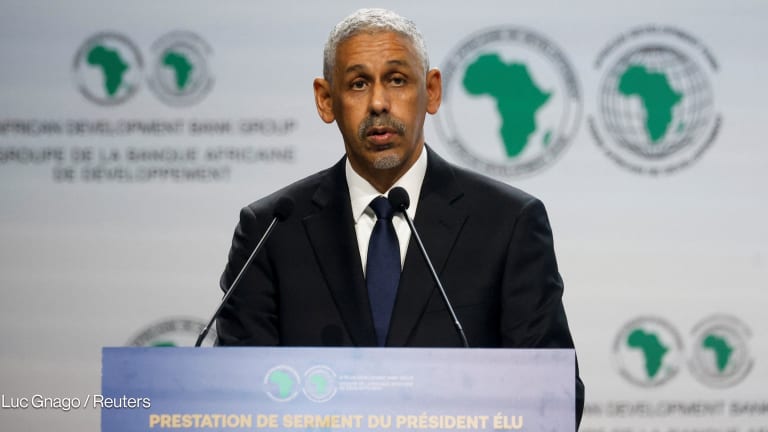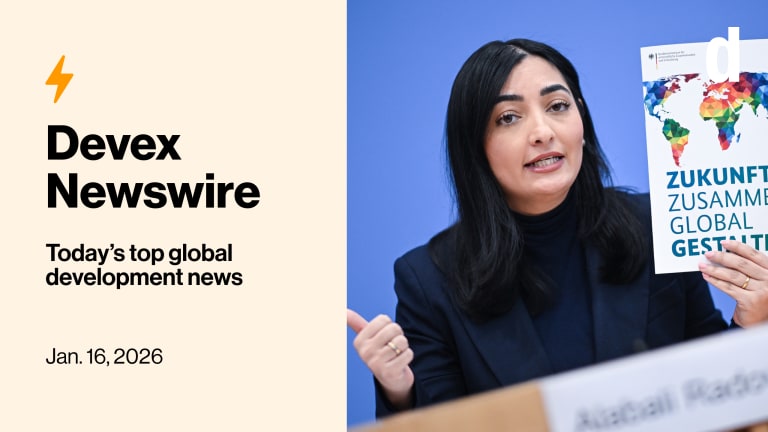AfDB-Cape Verde Partnership
To help Cape Verde achieve sustained, inclusive growth, AfDB will help the West African country diversify its economy, mainly by supporting private sector development and the government’s economic reform agenda.
A $33 million seaport project is among the infrastructure projects the African Development Bank will be implementing in Cape Verde from 2014 to 2018. Photo by: AfDB Since shifting to a democratic form of government in 1991, Cape Verde has made considerable progress in strengthening its public systems. The 2013 Ibrahim Index of African Governance ranked the West African country the third-highest in terms of its performance in governance, next only to Mauritius and Botswana. In the same year, Transparency International’s Corruption Perception Index found Cape Verde to be the second-least corrupt nation in sub-Saharan Africa. In terms of strengthening its economy, Cape Verde has also gained ground over the past decade, graduating from the United Nations’ list of least developed countries in 2007. However, the recent global economic downturn and the ongoing European financial crisis have substantially affected the country’s growth, causing a sharp decline in foreign direct investment and tourism — Cape Verde’s top economic drivers. Data from the African Development Bank shows growth of the country’s gross domestic product has slowed over the past five years, averaging below 4 percent. Further, projected growth levels for 2014 and 2015 are expected to dip further to about 3 percent. While Cape Verde has several trading partners, Europe accounts for most of its imports and exports — an astounding 80 percent and 90 percent, respectively — leaving the country highly vulnerable to the effects of the economic crisis in the region. AfDb notes that in order to achieve sustained, inclusive growth, the middle-income country must diversify its economy. The bank believes this can be achieved by supporting Cape Verde’s private sector and stepping up the implementation of the government’s economic reform agenda, while also striving toward climate resilience. Integration into the Economic Community of West African States will likewise be a crucial step. Funding levels Between 2009 and 2013, AfDB funded 11 projects, which amounted to $222.85 million. Eight programs have so far been identified for fiscal years 2014-2018. The total indicative budget for five of these is $130.5 million, while the allocation for the remaining three is yet to be determined. Aid will be delivered mainly through budget support, stand-alone local projects and the private sector. Complementary support in the form of trust funds and grants will also be provided for technical assistance, targeted analytical and advisory services, and institutional development. As part of its nonlending program, AfDB will also identify activities that will broaden access to financial services for small and medium enterprises. Funding priorities For the duration of this funding strategy, AfDB will have two main areas of focus, namely: - Enhancing and diversifying infrastructure for sustainable development. - Strengthening economic governance in the public and private sectors. Under the first priority area, allocations will be made toward the construction and rehabilitation of seaports as well as strengthening the country’s connectivity to its neighboring states through improved maritime transportation. By investing in these areas, AfDB hopes to transform Cape Verde into the region’s transshipment hub and integrate the geographically isolated nation into the ECOWAS trade system. Attention will also be given to the energy sector, with focus on scaling up production and expanding networks in view of reducing the cost of doing business and promoting renewable resources. Detailed below are AfDB’s indicative lending programs for infrastructure development. To strengthen economic governance, AfDB will provide budget support targeted at catalyzing business creation and encouraging the flow of investments to build private sector competitiveness and diversify the country’s economic base. The bank will also assist the government in project prioritization and rationalization, and in developing its management mechanisms for state-owned enterprises. Support will also be given toward better utilization of private sector funding, including through resource mobilization via public-private partnerships. As of January 2014, the bank’s active operations in Cape Verde comprises two projects in the energy sector, the Praia airport expansion and modernization project, a technology park project, three multisector projects and a sector study for water and sanitation — all amounting to $124.2 million. The chart below breaks down this total funding by sector. Devex analysis The outlook for Cape Verde remains positive, as its government continues to exhibit commendable performance and a willingness to enact reforms necessary for the country’s development. However, risks still remain. AfDB notes that limited capacity across several sectors is the most serious threat to delivering aid to the country as it dampens the impact of bank interventions. As a countermeasure, technical assistance and training for Cape Verdean institutions will be embedded throughout AfDB’s programs. Meanwhile, recent studies — including the Public Expenditure Management and Financial Accountability Review, Global Action Plan for Public Financial Management Reforms, Public Expenditure and Financial Accountability Assessment, and the AfDB report on national competitive bidding procedures — found that there is moderate fiduciary risk in public procurement. Cape Verde’s public procurement law remains inconsistent with implementation guidelines, particularly in areas of prequalification and selection. This translates to weak evaluation mechanisms that do not necessarily award contracts to the most qualified applicants. Moreover, the law disallows foreign bidders from participating in competitive processes that are supposedly open to international firms. The reports also note that existing safeguards against fraud are insufficient. To mitigate these risks, AfDB will directly support public procurement systems and assist in project management. The bank will also engage the government in strengthening public-private partnerships and furthering the country’s integration into the ECOWAS. The bank will maintain close coordination with its other development partners as well, particularly the Luxembourg Agency for Development Cooperation and the European Union, for developing renewable energy sources and vocational training. The EU will also be involved in structuring a budget support matrix with AfDB and the World Bank. While it has huge potential to elevate itself to upper-middle income status, Cape Verde is still in a precarious position where it can either continue on its path toward development or face economic decline. With its new country partnership strategy, AfDB has positioned itself to help the West African country realize its development goals through the next half-decade. Contact Tel: (225) 2020-4046 Email:
A $33 million seaport project is among the infrastructure projects the African Development Bank will be implementing in Cape Verde from 2014 to 2018. Photo by: AfDB
Since shifting to a democratic form of government in 1991, Cape Verde has made considerable progress in strengthening its public systems. The 2013 Ibrahim Index of African Governance ranked the West African country the third-highest in terms of its performance in governance, next only to Mauritius and Botswana. In the same year, Transparency International’s Corruption Perception Index found Cape Verde to be the second-least corrupt nation in sub-Saharan Africa.
In terms of strengthening its economy, Cape Verde has also gained ground over the past decade, graduating from the United Nations’ list of least developed countries in 2007. However, the recent global economic downturn and the ongoing European financial crisis have substantially affected the country’s growth, causing a sharp decline in foreign direct investment and tourism — Cape Verde’s top economic drivers.
This story is forDevex Promembers
Unlock this story now with a 15-day free trial of Devex Pro.
With a Devex Pro subscription you'll get access to deeper analysis and exclusive insights from our reporters and analysts.
Start my free trialRequest a group subscription Printing articles to share with others is a breach of our terms and conditions and copyright policy. Please use the sharing options on the left side of the article. Devex Pro members may share up to 10 articles per month using the Pro share tool ( ).
As former Devex editor for business insight, Aimee created and managed multimedia content and cutting-edge analysis for executives in international development.








